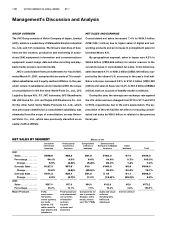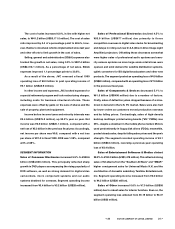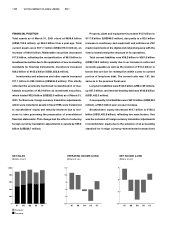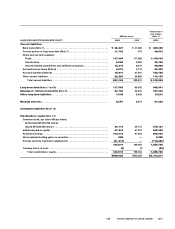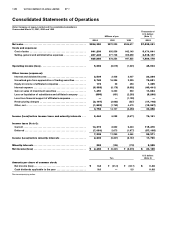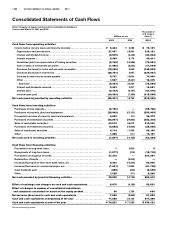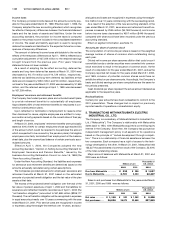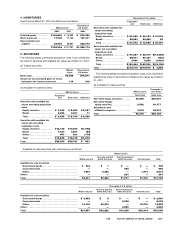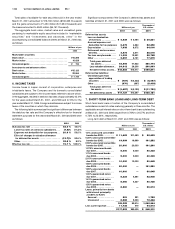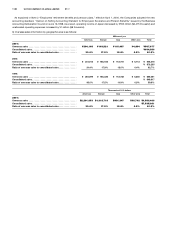JVC 2001 Annual Report Download - page 32
Download and view the complete annual report
Please find page 32 of the 2001 JVC annual report below. You can navigate through the pages in the report by either clicking on the pages listed below, or by using the keyword search tool below to find specific information within the annual report.
Notes to Consolidated Financial Statements
Victor Company of Japan, Limited and its consolidated subsidiaries
Years ended March 31, 2001, 2000 and 1999
1. BASIS OF PRESENTING CONSOLIDATED FINANCIAL
STATEMENTS
Victor Company of Japan, Limited (the “Company”) and its
consolidated domestic subsidiaries maintain their accounts and
records in accordance with the provisions set forth in the Japanese
Commercial Code and the Securities and Exchange Law and in
conformity with accounting principles and practices generally
accepted in Japan, which are different from the accounting and
disclosure requirements of International Accounting Standards. The
accounts of overseas consolidated subsidiaries are based on their
accounting records maintained in conformity with generally accepted
accounting principles and practices prevailing in the respective coun-
tries of domicile.
The accompanying consolidated financial statements are a transla-
tion of the audited consolidated financial statements of the Company
which were prepared in accordance with accounting principles and
practices generally accepted in Japan from the accounts and records
maintained by the Company and its consolidated subsidiaries and were
filed with the appropriate Local Finance Bureau of the Ministry of
Finance as required by the Securities and Exchange Law.
In preparing the accompanying consolidated financial statements,
certain reclassifications have been made in the consolidated finan-
cial statements issued domestically in order to present them in a
form which is more familiar to readers outside Japan. The consoli-
dated statements of cash flows for 1999 and stockholders’ equity for
2001, 2000 and 1999 have been prepared for the purpose of inclu-
sion in the accompanying consolidated financial statements, although
such statements were not required for domestic purposes and were
not filed with the regulatory authorities.
The Company prepared the 2001 and 2000 consolidated cash flow
statements as required by and in accordance with the “Standards for
Preparation of Consolidated Cash Flow Statements, etc.” effective
from the year ended March 31, 2000. The 1999 consolidated state-
ment of cash flows have not been restated. Significant differences in
the consolidated statement of cash flows for 2001 and 2000 and
those for 1999 include the use of pretax income in 2001 and 2000
instead of net loss in 1999, additional disclosure in cash flows from
operating activities in 2001 and 2000 of interest expense, income tax
expense, interest and dividend income, interest and dividend received
and income taxes paid.
The translation of the Japanese yen amounts into U.S. dollars are
included solely for the convenience of the reader, using the prevail-
ing exchange rate at March 31, 2001, which was ¥124 to U.S.$1.00.
The convenience translations should not be construed as represen-
tations that the Japanese yen amounts have been, could have been,
or could in the future be, converted into U.S. dollars at this or any
other rate of exchange.
2. SUMMARY OF SIGNIFICANT ACCOUNTING POLICIES
Principles of consolidation
The consolidated financial statements include the accounts of the
Company and its significant subsidiaries. All significant intercompany
transactions and accounts have been eliminated.
Effective for the year ended March 31, 2000, all companies are
required to consolidate all significant investees which are controlled
through substantial ownership of majority voting rights or existence
of certain conditions. Previously, only majority-owned companies were
consolidated. The prior years’ consolidated financial statements have
not been restated.
The effect of applying this rule to the Company’s consolidated
financial statements was immaterial.
Investments in certain unconsolidated subsidiaries and affiliated
companies (20% to 50% owned and certain others 15% to 20%
owned) are, with minor exceptions, stated at their underlying net equity
value after elimination of unrealized intercompany profits and losses.
The Company’s investments in its remaining subsidiaries and affili-
ated companies are immaterial in the aggregate, and are stated at
cost or less.
The differences between acquisition cost and underlying net equity
at the time of acquisition are generally being amortized on the straight-
line method over five years.
Foreign currency translation
Current assets and liabilities denominated in foreign currencies are
translated into Japanese yen at exchange rates prevailing at the bal-
ance sheet dates except for those hedged by foreign currency forward
contracts, which are recorded at contract rates. Prior to April 1, 2000,
non-current assets and liabilities denominated in foreign currencies
were translated at historical exchange rates.
Effective April 1, 2000, the Company and its consolidated
subsidiaries (the “Companies”) adopted the revised accounting stan-
dard for foreign currency translation, “Opinion Concerning Revision
of Accounting Standard for Foreign Currency Translation,” issued
by the Business Accounting Deliberation Council on October 22,
1999 (the “Revised Accounting Standard”). Under the Revised
Accounting Standard, long-term receivables and payables denomi-
nated in foreign currencies are also translated into Japanese yen at
the year-end rate.
The effect on the consolidated statement of operations of adopt-
ing the Revised Accounting Standard was immaterial.
Balance sheets of consolidated overseas subsidiaries are translated
into Japanese yen at the year-end rate except for shareholders’ equity
accounts, which are translated at the historical rates.
Income statements of consolidated overseas subsidiaries are trans-
lated at average rates except for transactions with the Company,
which are translated at the rates used by the Company.
Due to the adoption of the Revised Accounting Standard, the Com-
pany reports foreign currency translation adjustments in the stock-
holders’ equity and minority interests. The prior year’s amount, which
is included in assets, has not been reclassified.
Cash and cash equivalents
In preparing the consolidated statements of cash flows for the years
ended March 31, 2001, and 2000 cash on hand, readily available
deposits and short-term highly liquid investments with maturities of
not exceeding three months at the time of purchase are considered
to be cash and cash equivalents. Consolidated statement of cash
flows for 1999 used cash and time deposits instead of cash and cash
equivalents.
Inventories
Inventories are stated at cost, which is determined by the average
cost method.
< 30 VICTOR COMPANY OF JAPAN, LIMITED 31 >


